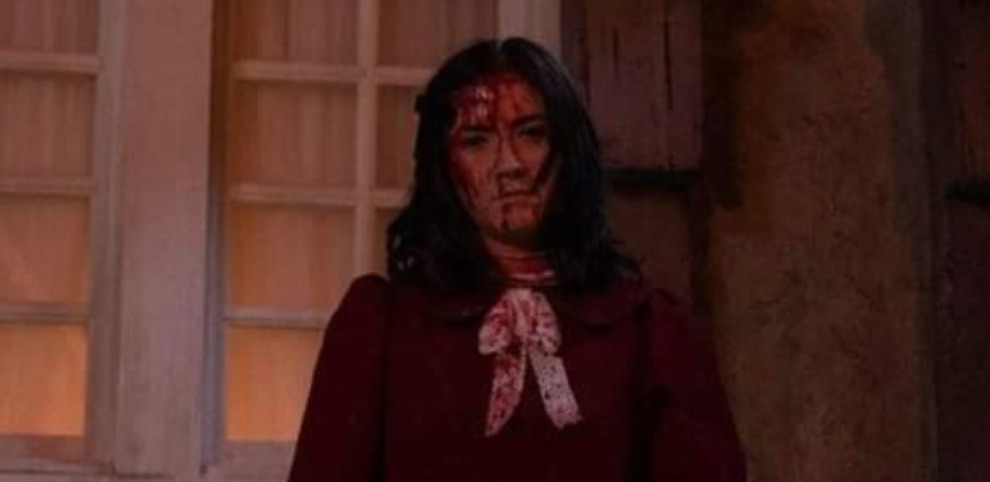“Orphan: First Kill” and the Birth of a Camp Classic

When Orphan first premiered in 2009, it was easy to dismiss. With an unknown child star, family themes, and overall softer feel, the original film from director Jaume Collet-Serra felt a bit like a studio dump who’s impressive adult cast managed to get it onto the big screen. But like its titular villain, there is much more to Orphan than meets the eye. If you’ve somehow avoided its jaw-dropping twist for all these years, stop reading right now and go watch the film. It’s worth it, I promise. With a killer performance from a then 10-year-old Isabelle Furhman and a solid emotional core, Orphan has aged incredibly well. Thirteen years later–yes, the original film is now older than its villain purports to be–the announcement of a prequel seemed to come out of nowhere. Director William Brent Bell could easily have rested on the fondly remembered laurels of Orphan and delivered a crowd pleasing rehash of the original story. But Orphan: First Kill is a blast, from start to finish; a surprisingly fun and bloody horror movie that throws our expectations to the wind.
First Kill is set a year or so before John and Kate Coleman adopt Esther. We meet her as a 30-something woman named Leena, the most dangerous woman in a psychiatric prison. Furhman effortlessly slips back into the role of the murderous orphan, obviously enjoying her tiny character’s larger-than-life maliciousness. Once again she dances between villain and angel with a furrowed brow or change of expression. With the audience in on her secret, she’s able to milk every drop out of this deception and becomes a sort of anti-hero. The film’s opening act follows her escape from the Saarn Institute, the source of her incriminating bible turned scrapbook full of exposition. The sirens wail, the blood flies, and a couple of shocking kills distract us from how easily she’s able to get away. A later scene in which Esther plays classical piano in her most recent victim’s home while covered in blood is just icing on the cake.
If continuity is to be believed, Leena is successfully passing as an 8-year old child. Fuhrman does look younger than her 25 years, but it’s still a tough sell. Clever staging, platform shoes, de-aging make-up, and liberal use of a child stand-in combine to create the effect that Leena/Esther is young, to varying degrees of success. It’s usually pretty obvious that she’s a grown woman posing as a child, adding to the film’s camp value. Aside from the optics, Fuhrman’s performance now is just as good as it was thirteen years ago and given the family she finds herself stuck with, it’s tempting to root for the murderous psychopath.
Once Leena has escaped, the real story begins as she claims to be Esther Albright, the missing child of a wealthy family. Julia Stiles is Tricia Albright, a mother who believes her missing daughter has been found after four years only to wind up suspicious of the stranger now living in her house. Her husband Allen (Rossif Sutherland) is endearing in his honest desire to reunite with his little girl, but one wonders about his mental acuity with all of this farcical drama occurring under his nose. Matthew Finlan is effectively smarmy as Gunnar, the douchebag older brother who spends most of his time fencing and reveling in the luck of his birth. They are a far cry from the relatable Coleman family and First Kill is missing the tenderness of the original film. But what it lacks in emotion, it more than makes up for with a roller coaster of a story.
You see, Esther is not the only one with a secret. A shocking twist midway through the film propels us in a new direction that more than makes up for the clunky dialogue and unbelievable plot. This is pure camp fun and the more willing you are to roll with the nutty plot as it unfolds, the more fun you’ll have. Bell compensates for the lack of an emotional hook by upping the gore factor and allowing his protagonist to have a little fun. The retcon about her talent for blacklight painting, a bizarre but beautiful reveal in the original film, is visually stunning in the luxurious house. And a fabulous scene where Esther kicks back, puts on a little lipstick, and tools down the road in a stolen car is more than worth the price of admission..
Like vegetables with chocolate cake, Bell attempts to make a statement about privilege, generational power, and the elite’s desire to hold onto their place in a patriarchal system. It goes down about as well as you’d expect. The on-the-nose script wades into muddy waters with ableist diologue and forces us to empathize with a murderer against a family of monsters. In a story where we’ve already been told the outcome, it’s difficult to know who to root for and the only innocent is too oblivious to his surroundings to ever be taken seriously. But these problems are small blips on the radar in what is mostly a bloody fun good time.
Orphan: First Kill could have been just another prequel, but by flipping the story on its head it manages to be much more fun than it has any right to be. Bell’s film is the best kind of popcorn movie. It looks great, the kills are shocking but not too visceral, and it doesn’t take itself too seriously. Everyone is in on the joke and Fuhrman seems to be having a ball as the delightfully deviously killer who made her famous. Much like the original, Orphan: First Kill is a surprisingly fun horror film. See it before someone spoils the twist and remember to check your cynicism at the door.